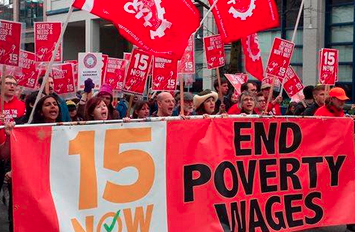The deepening chasm between the wealthiest Americans and everyone else is a problem that needs to be addressed now, and government should play a greater role in solving the problem. That’s the consensus of a majority of Americans who responded to a new New York Times/CBS News poll on Americans’ view of income inequality and workers’ rights.
Sixty-five percent of more than 1,000 adults questioned by phone in May said something should be done now to deal with America’s growing wealth inequality, and 57 percent said the government should do more to reduce the wealth gap.
“Americans are broadly concerned about inequality of wealth and income despite an economy that has improved by most measures, a sentiment that is already driving the 2016 Presidential contest,” said The New York Times report.
Other findings of the report include:
- Sixty-six percent of those surveyed say that wealth should be more evenly distributed among more people.
- A majority of both parties believe the wealth gap is getting larger (56 percent of Republicans and 74 percent of Democrats).
- A majority of both parties say it’s mainly just the wealthiest who have a chance to get ahead (53 percent of Republicans and 65 percent of Democrats).
- Two-thirds of Americans (a majority of both parties) favor raising taxes on people earning more than $1 million per year (87 percent of Democrats favor it, and 53 percent of Republicans).
- A majority (seven in 10) of those questioned favor raising the minimum wage to $10.10 from $7.25 an hour. However, only 50 percent of Republicans favor it while 86 percent of Democrats support a raise.
- Most Americans want the government to take a greater role in solving the problem, but partisanship is getting in the way: Only one-third of Republicans support a more active government role, while eight in 10 of Democrats favor the government doing more.
- By a 50 to 45 percent margin, Americans favored capping the income of top executives at large corporations. But a partisan divide was revealed: Sixty percent of Democrats favor limiting CEO pay, while 61 percent of Republicans opposed capping compensation.
These results, and others, suggest the issue of income and wealth inequality is a major concern of most Americans, but differences remain over how to solve the problem. One solution is to support collective bargaining rights, through which workers are more fairly compensated.
The decline of union strength over the past several decades because of anti-worker laws such as right-to-work scams, and the efforts of corporate-driven lawmakers like Wisconsin Gov. Scott Walker to undermine workers’ collective bargaining rights, “account in no small part for rising inequality,” according to a report written by Colin Gordon, a senior research consultant and author at the Iowa Policy Project.
“By most estimates, declining unionization accounted for about a third of the increase in inequality in the 1980s and 1990s,” Gordon wrote. Later, financial deregulation played a greater role in lining the pockets of those “at the top of the income scale,” he said.
Listen to former Secretary of Labor Robert Reich about why strong unions are good for America.
